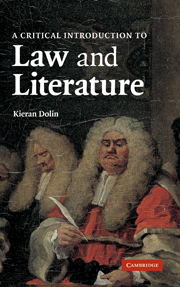Book contents
- Frontmatter
- Contents
- Preface
- Introduction to law and literature: walking the boundary with Robert Frost and the Supreme Court
- PART I EMINENT DOMAINS: THE TEXT OF THE LAW AND THE LAW OF THE TEXT
- PART II LAW AND LITERATURE IN HISTORY
- 3 Renaissance humanism and the new culture of contract
- 4 Crime and punishment in the eighteenth century
- 5 The woman question in Victorian England
- 6 The common law and the ache of modernism
- 7 Rumpole in Africa: law and literature in post-colonial society
- 8 Race and representation in contemporary America
- Conclusion
- Notes
- Bibliography
- Index
7 - Rumpole in Africa: law and literature in post-colonial society
Published online by Cambridge University Press: 05 June 2012
- Frontmatter
- Contents
- Preface
- Introduction to law and literature: walking the boundary with Robert Frost and the Supreme Court
- PART I EMINENT DOMAINS: THE TEXT OF THE LAW AND THE LAW OF THE TEXT
- PART II LAW AND LITERATURE IN HISTORY
- 3 Renaissance humanism and the new culture of contract
- 4 Crime and punishment in the eighteenth century
- 5 The woman question in Victorian England
- 6 The common law and the ache of modernism
- 7 Rumpole in Africa: law and literature in post-colonial society
- 8 Race and representation in contemporary America
- Conclusion
- Notes
- Bibliography
- Index
Summary
The colonisation of other lands by European nations must rank among the most significant movements of world history during the last 500 years. Few if any of the indigenous peoples of America, Asia, Africa or Oceania escaped the vast disruptions of imperialism. The empires of Spain, Britain, Holland and the rest, once so extensive and powerful, have now been dismantled, but the effects of this long domination may be seen in impoverished and unstable post-colonial societies across the globe. Law was obviously an indispensable resource in the maintenance and the justification of the empires, ‘a tool of colonialism, aesthetically representing Western rationality to native disorder and pragmatically overriding local understandings to suit the needs of the conqueror’. Literature too played an important role in inculcating the ideology of imperialism. However, literature and law could be tools of resistance as well as tools of oppression in the colonial context. Mahatma Gandhi and Nelson Mandela were lawyers who used the legal process to protest against the racially discriminatory laws of the colonisers. And for the newly independent nations and the anti-colonial movements of Africa and Asia in the 1950s and 1960s, literature assumed a special importance. It affirmed the identity of indigenous peoples through images of traditional society; it challenged the legitimacy of Western imperialism by telling stories of oppressive power; it portrayed the conditions and hopes of the emergent nations through national allegories.
- Type
- Chapter
- Information
- A Critical Introduction to Law and Literature , pp. 166 - 181Publisher: Cambridge University PressPrint publication year: 2007



